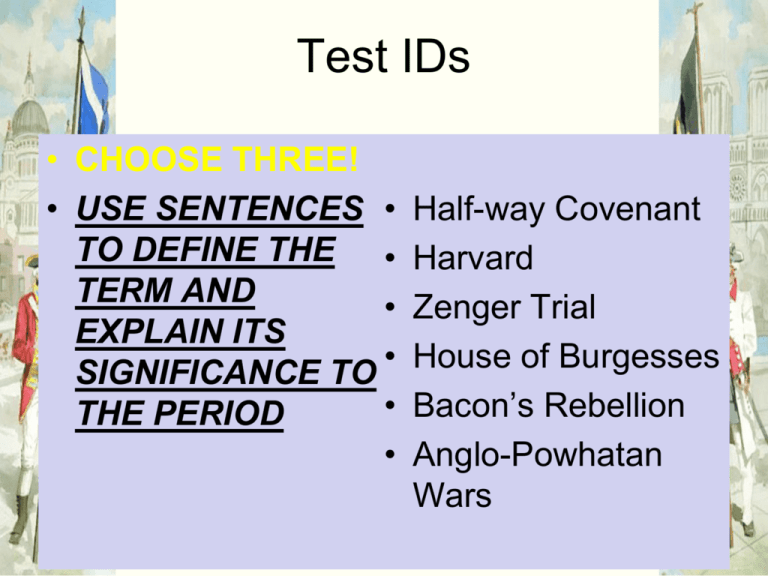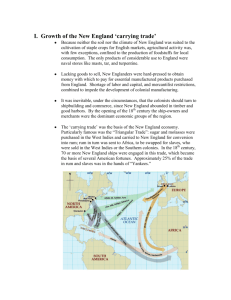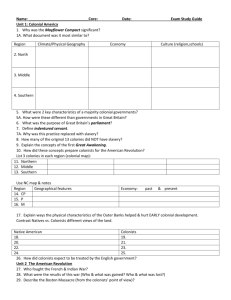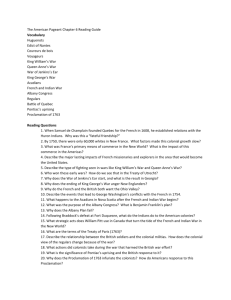The French-Indian War
advertisement

Test IDs • CHOOSE THREE! • USE SENTENCES • TO DEFINE THE • TERM AND • EXPLAIN ITS • SIGNIFICANCE TO • THE PERIOD • Half-way Covenant Harvard Zenger Trial House of Burgesses Bacon’s Rebellion Anglo-Powhatan Wars Period 3: 1754 – 1800 Key Concept 3.1 “Britain’s victory over France in the imperial struggle for North America led to new conflicts among the British government, the North American colonists, and American Indians, culminating in the creation of a new nation, the United States.” Historical Thinking Skills: Chronological Reasoning • Historical causation: Historical thinking involves the ability to identify, analyze, and evaluate multiple cause-and-effect relationships in a historical context, distinguishing between the long-term and proximate. Contest to control N. Am. Between 3 European powers: England, France, and Spain North America in 1750 BellRinger 1. Which nation on the map had the “best” colonies? Why? 2. Based on the map, what problems might arise among the European powers? North America in 1750 Class Activity Use the map provided to color the extent of the Spanish, French, & British colonial control in North America by 1750. A map key is required. French Settlement in North America • Latecomer to N. Am. • 1608; 1st permanent settlement: Quebec by Champlain on St. Lawrence River • New France: – Catholic – Slow Population Growth (60,000 in 1750) – Friendly relations with Huron Indians but enemies of Iroquois – Economy based on Fur Trade – Royal regime with little toleration of self-rule – 1718: spread down Miss. River and est. New Orleans 1754 Area of Clash: Fr. And Engl. 1754 The First Clash The Ohio Valley British Fort Necessity * George Washington French Fort Duquesne * Delaware & Shawnee Indians 1754 Albany Plan of Union Albany Congress (intercolonial meeting) A Arepresentatives from 7 colonies: New England, NY, MD, PA AIroquois Indians: trying to get them to stay on British side also trying to bolster colonial unity for defense against France A AWrote: Albany Plan of Union Colonial Unity?? Albany Plan of Union • Read the proposed plan 1. What is the purpose of the Albany Plan of Union? 2. Why do you think the plan was not ratified by colonial legislatures? 3. What was the message of Franklin’s political cartoon? 4. What might have been some arguments in support of the plan? Against the plan? 1756 War Is Formally Declared! Native American tribes exploited both sides! British-American Colonial Tensions Colonials Methods of Fighting: British • Indian-style guerilla • March in formation or bayonet charge. tactics. Military • Col. militias served Organization: under own captains. • Br. officers wanted to take charge of colonials. Military Discipline: • No mil. protocols observed. • Drills & tough discipline. Finances: • Resistance to rising taxes. • Colonists should pay for their own defense. Demeanor: • Casual, non-professionals. • Prima Donna Br. officers with servants & tea settings. War Ends 1763 Treaty of Paris France --> lost her Canadian possessions, and claims to lands east of the Mississippi River. Spain --> got all French lands west of the Mississippi River, New Orleans, but lost Florida to England. England --> got all French lands in Canada, and exclusive rights to Caribbean slave trade North America in 1763 Use the map provided to identify the areas under Spanish, French, & British control after the French & Indian War (by 1763) Effects of the War on Britain? 1. It increased her colonial empire in the Americas. 2. It enlarged England’s debt. 3. Britain’s contempt for the colonials created bitter feelings. Therefore, England felt that a major reorganization of her American Empire was necessary! Effects of the War on the American Colonials • Optimism and self-confidence • Fear of French or Spanish attack eliminated • Western lands now opened for settlement by colonists • Colonists gain valuable wartime experience, confidence in ability to provide for own defense • It united them against a common enemy for the first time. • It created bitter feelings towards the British that would only intensify. Americans’ Views About the British “The regulars “In general the dirtiest, most contemptible, cowardly dogs that you can conceive.” – British General Wolfe – Colonists complain about mistreatment by British officers – feel like “second-class English citizens” – Colonists appalled at brutality of punishment by British leaders on infantrymen. Daily “shrieks and cries” of whipped soldiers. “There was a man whipped to death belonging to the Light Infantry. They say he had twenty-five lashes after he was dead.” – American soldier’s diary are but little better than slaves to their officers.” – Mass. Soldier’s diary Americans’ Self Image – Still strong loyalty among most to British crown – Many begin to view themselves as different from British but not yet strong cohesion between colonists Warm Up Review • Please refer to your homework video questions to review the French and Indian War Impact of War with Native Americans – Indians in the interior lose French and Spanish allies – They feel vulnerable – Conflict between British colonists increases as whites move into former French territory Impact of War with Native Americans • Warm-Up: Review Questions from Station #2 1. What led to Pontiac’s War? 2. Given what you know about the difference between French and British colonialism, why might Chief Pontiac have once said, “I am French, and I want to die French?” 3. Why might the Proclamation of 1763 have angered American colonists? The Aftermath: Tensions Along the Frontier 1763-1769 Pontiac’s Rebellion Fort Detroit “I am French, and I want to die French.”—Chief Pontiac Pontiac’s Rebellion (1763) BACKLASH! British Proclamation Line of 1763. Colonials Don’t want to be told WHERE to LIVE! Britain: Trying to protect colonists from Indian attacks! End of Salutary Neglect • Permanent standing army – British navy and army permanently stationed in colonies to defend the frontier • New rules for searches and seizures – “Writs of assistance” used to enforce navigation and trade laws more strictly – Allowed British customs officials to search for smuggled goods anywhere without a warrant George Grenville’s Program, 1763-1765 1. Sugar Act - 1764 2. Quartering Act - 1765 3. Stamp Act - 1765 End of Salutary Neglect • 1. Sugar Act (1764) – Duties (import taxes) on sugar and other goods. – First time that taxes used to raise revenue for Britain and not just to regulate trade. – Smugglers would be tried in viceadmiralty courts by crown-appointed judges, not by a jury of their peers. End of Salutary Neglect • 2. Quartering Act (1765) – Colonial governments required to provide food and living quarters for British soldiers. – New York legislature suspended for six months by Governor for resisting to enforce the law. End of Salutary Neglect • 3. Stamp Act (1765) – First direct (“internal”) tax imposed by Britain on colonies – Tax on most printed documents: newspapers, almanacs, pamphlets, deeds, wills, licenses. Colonial Opposition! • Anti- Stamp Act resolution passed by House of Burgesses in Virginia (May 1765) – Supported local taxation only UNLESS colonists had representation in British Parliament – No Taxation without Representation! Patrick Henry Colonial Opposition! • Stamp Act Congress, NYC (October 1765) – Nine colonies sent delegates – Issued “Declaration of Rights” – Supported a non-importation agreement (BOYCOTT) – Probably most effective tactic Colonial Opposition! • Mob actions – “Sons of Liberty” secret groups formed, harass, humiliate, tar and feather stamp collectors – Civil unrest, esp. in cities during summer of 1765 – Largest in Boston, including mob attack on Lieutenant Governor Thomas Hutchinson’s home – Attacks on symbols of British authority and colonial wealth. DBQ Evaluate the extent to which the French and Indian War altered relations between Britain and its American colonies – Use the documents and your knowledge of the period from 1740-1766 DBQ • In pairs, summarize the following: – Read through the documents – Answer the document guided questions – Develop a thesis statement – Develop categories of analysis • Suggested: Political, Economical, and Ideological! – List evidence in each category Closure Activity • In pairs, summarize the following: – As a result of the French & Indian War, how have things changed? Why was the war such a “turning point”? – From the British gov’t perspective, why are these changes necessary? – From the colonial perspective, why are these changes difficult to handle? End of Salutary Neglect • New imperial program initiated by King George III (1760) and Prime Minister George Greenville (1763) • British need to recover cost of war and decide how to “protect” its colonies









